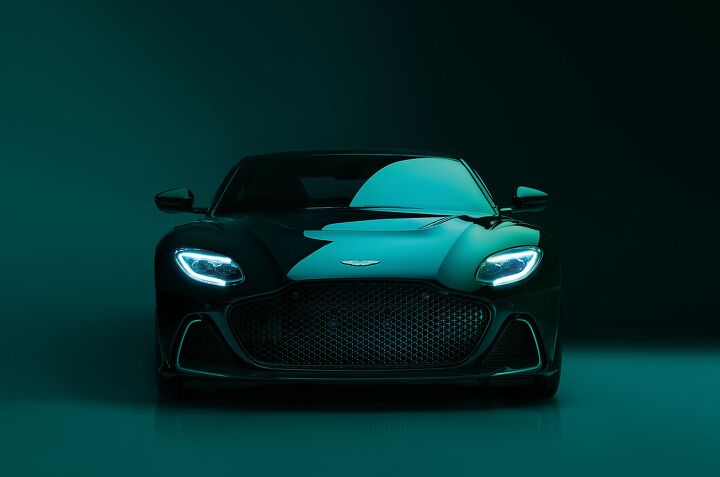Report: Aston Martin Actually Won’t Be Going All Electric

Despite previously having vowed to offer an entirely electric lineup by 2030, Aston Martin has decided to continue selling internal-combustion vehicles beyond the next decade. Company chairman Lawrence Stroll now believes that there will always be demand for combustion engines. Apparently, customers had conveyed to Aston dealers that they still prefer traditional powertrains and want the sensations associated with gasoline-powered automobiles.
Speaking with Autocar, Stroll said he intends for the brand to continue offering liquid-fueled vehicles for as long as governments allow. As things currently stand, the European Union has said it would provide exemptions for boutique manufacturers selling in extremely low volumes after 2035. But Aston Martin already moves too much metal, presumably requiring it to create a specialty subbrand selling a limited number of combustion vehicles each year.
Then again, EV sales aren’t anywhere near the industry or government regulators want them to be. Meanwhile, the public seems fed up with untenable regulatory schemes that are effectively steering the market in ways that don’t really advantage everyday consumers. While this fact hasn’t encouraged Western regulators to change course, it may be making opposition parties favoring deregulation more appetizing to voters.
None of this means Aston is abandoning electrification. While It has decided to delay the launch of its first electric vehicle by two years for a 2027 release date, it’s also increased its EV development budget. However, the company seems like it’s going to shift its focus toward plug-in hybrids — which may allow it to appease regulators while simultaneously satisfying its consumer base.
From Autocar:
Aston Martin has developed a bespoke EV architecture and plans to launch four electric cars on it – a GT, SUV, crossover and ‘mid-engined’ supercar – but they won't hit the market before 2027 after a reveal of the first model in late 2026.
"We have designed and ready one platform to take four different vehicles," Stroll told Autocar. "We have all the products technically engineered and physically designed.
“We planned to launch at the end of 2025 and were ready to do so, but it seems there is a lot more hype in EVs, politically driven or whatever, than consumer demand, particularly at an Aston Martin price point."
He added that demand for electric cars is particularly weak in the luxury segments, as Aston Martins were typically not 'first' cars for their customers and used more for leisure.
Stroll said Aston "will get there" with electric cars, "but at the previously [stated] date, definitely not"
Chairman Stroll made it very clear that he envisions hybrids as the path forward for Aston Martin. But it’s hard for that to mean anything after so many automakers spent the last decade telling the world how they’re on the cusp of a historic shift to totally electrified powertrains. What good is a promise from an industry that (with some exceptions) never seems to mean what it says?
For now, the company plans to focus on hybridizing its V8 powerplants because its customers tend to prefer them over V6s. The first example is supposed to be the mid-engined Valhalla (below) that’s slated to launch later this year. Subsequent models will see comprehensive refreshes the company claimed would include hybridization. Aston Martin believes it can set up vehicles to operate fully electric to traverse city centers that may have restrictions on combustion engines and then swap to hybrids where the gasoline and electric motors work together to maximize performance.
[Images: Aston Martin]
Become a TTAC insider. Get the latest news, features, TTAC takes, and everything else that gets to the truth about cars first by subscribing to our newsletter.
[Images: Aston Martin]

A staunch consumer advocate tracking industry trends and regulation. Before joining TTAC, Matt spent a decade working for marketing and research firms based in NYC. Clients included several of the world’s largest automakers, global tire brands, and aftermarket part suppliers. Dissatisfied with the corporate world and resentful of having to wear suits everyday, he pivoted to writing about cars. Since then, that man has become an ardent supporter of the right-to-repair movement, been interviewed on the auto industry by national radio broadcasts, driven more rental cars than anyone ever should, participated in amateur rallying events, and received the requisite minimum training as sanctioned by the SCCA. Handy with a wrench, Matt grew up surrounded by Detroit auto workers and managed to get a pizza delivery job before he was legally eligible. He later found himself driving box trucks through Manhattan, guaranteeing future sympathy for actual truckers. He continues to conduct research pertaining to the automotive sector as an independent contractor and has since moved back to his native Michigan, closer to where the cars are born. A contrarian, Matt claims to prefer understeer — stating that front and all-wheel drive vehicles cater best to his driving style.
More by Matt Posky
Latest Car Reviews
Read moreLatest Product Reviews
Read moreRecent Comments
- Varezhka I have still yet to see a Malibu on the road that didn't have a rental sticker. So yeah, GM probably lost money on every one they sold but kept it to boost their CAFE numbers.I'm personally happy that I no longer have to dread being "upgraded" to a Maxima or a Malibu anymore. And thankfully Altima is also on its way out.
- Tassos Under incompetent, affirmative action hire Mary Barra, GM has been shooting itself in the foot on a daily basis.Whether the Malibu cancellation has been one of these shootings is NOT obvious at all.GM should be run as a PROFITABLE BUSINESS and NOT as an outfit that satisfies everybody and his mother in law's pet preferences.IF the Malibu was UNPROFITABLE, it SHOULD be canceled.More generally, if its SEGMENT is Unprofitable, and HALF the makers cancel their midsize sedans, not only will it lead to the SURVIVAL OF THE FITTEST ones, but the survivors will obviously be more profitable if the LOSERS were kept being produced and the SMALL PIE of midsize sedans would yield slim pickings for every participant.SO NO, I APPROVE of the demise of the unprofitable Malibu, and hope Nissan does the same to the Altima, Hyundai with the SOnata, Mazda with the Mazda 6, and as many others as it takes to make the REMAINING players, like the Excellent, sporty Accord and the Bulletproof Reliable, cheap to maintain CAMRY, more profitable and affordable.
- GregLocock Car companies can only really sell cars that people who are new car buyers will pay a profitable price for. As it turns out fewer and fewer new car buyers want sedans. Large sedans can be nice to drive, certainly, but the number of new car buyers (the only ones that matter in this discussion) are prepared to sacrifice steering and handling for more obvious things like passenger and cargo space, or even some attempt at off roading. We know US new car buyers don't really care about handling because they fell for FWD in large cars.
- Slavuta Why is everybody sweating? Like sedans? - go buy one. Better - 2. Let CRV/RAV rust on the dealer lot. I have 3 sedans on the driveway. My neighbor - 2. Neighbors on each of our other side - 8 SUVs.
- Theflyersfan With sedans, especially, I wonder how many of those sales are to rental fleets. With the exception of the Civic and Accord, there are still rows of sedans mixed in with the RAV4s at every airport rental lot. I doubt the breakdown in sales is publicly published, so who knows... GM isn't out of the sedan business - Cadillac exists and I can't believe I'm typing this but they are actually decent - and I think they are making a huge mistake, especially if there's an extended oil price hike (cough...Iran...cough) and people want smaller and hybrids. But if one is only tied to the quarterly shareholder reports and not trends and the big picture, bad decisions like this get made.



































Comments
Join the conversation
This just in: Aston Martin may avoid insolvency after all.
If this is true then they won't go out of business. Good for them!